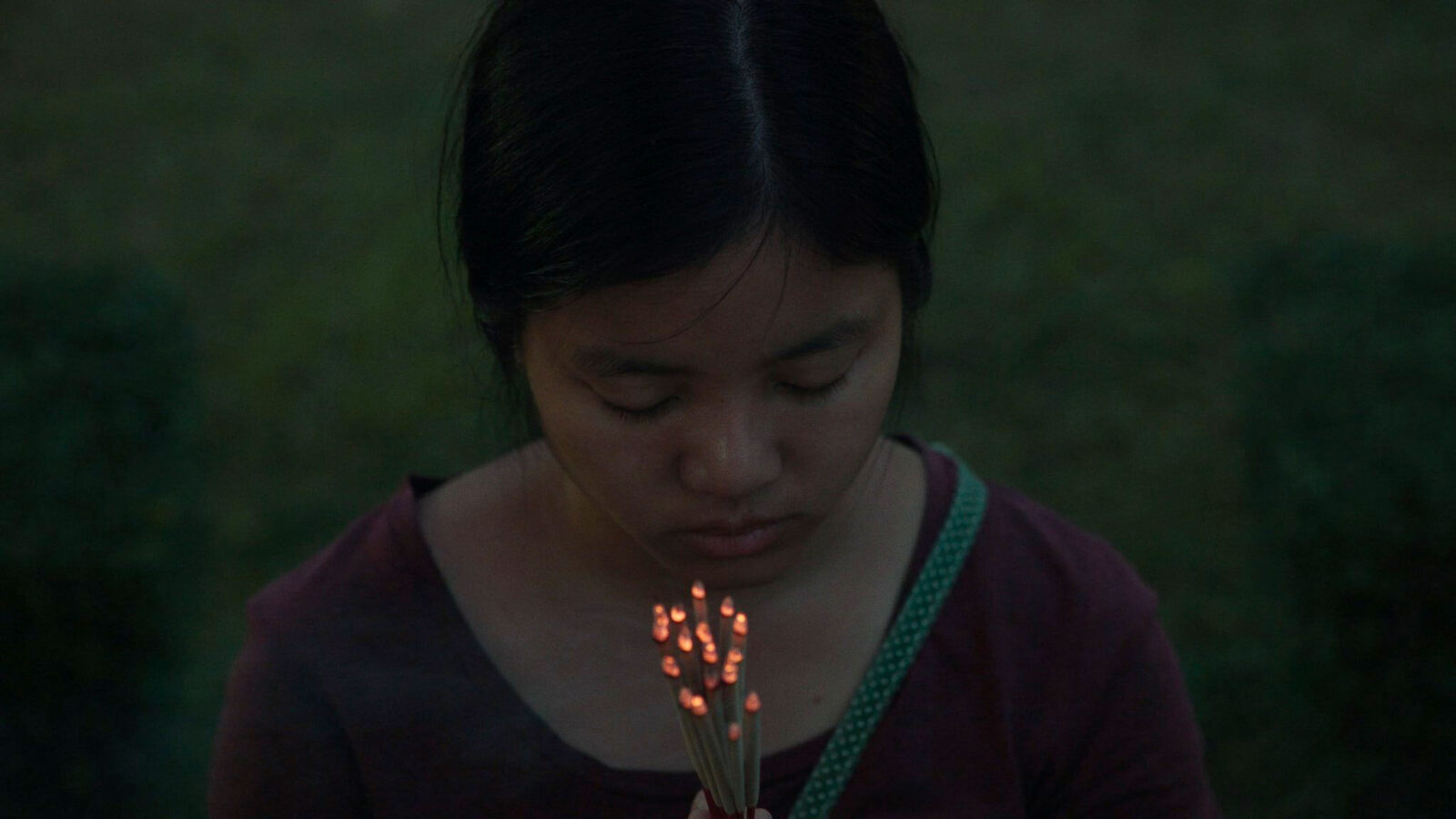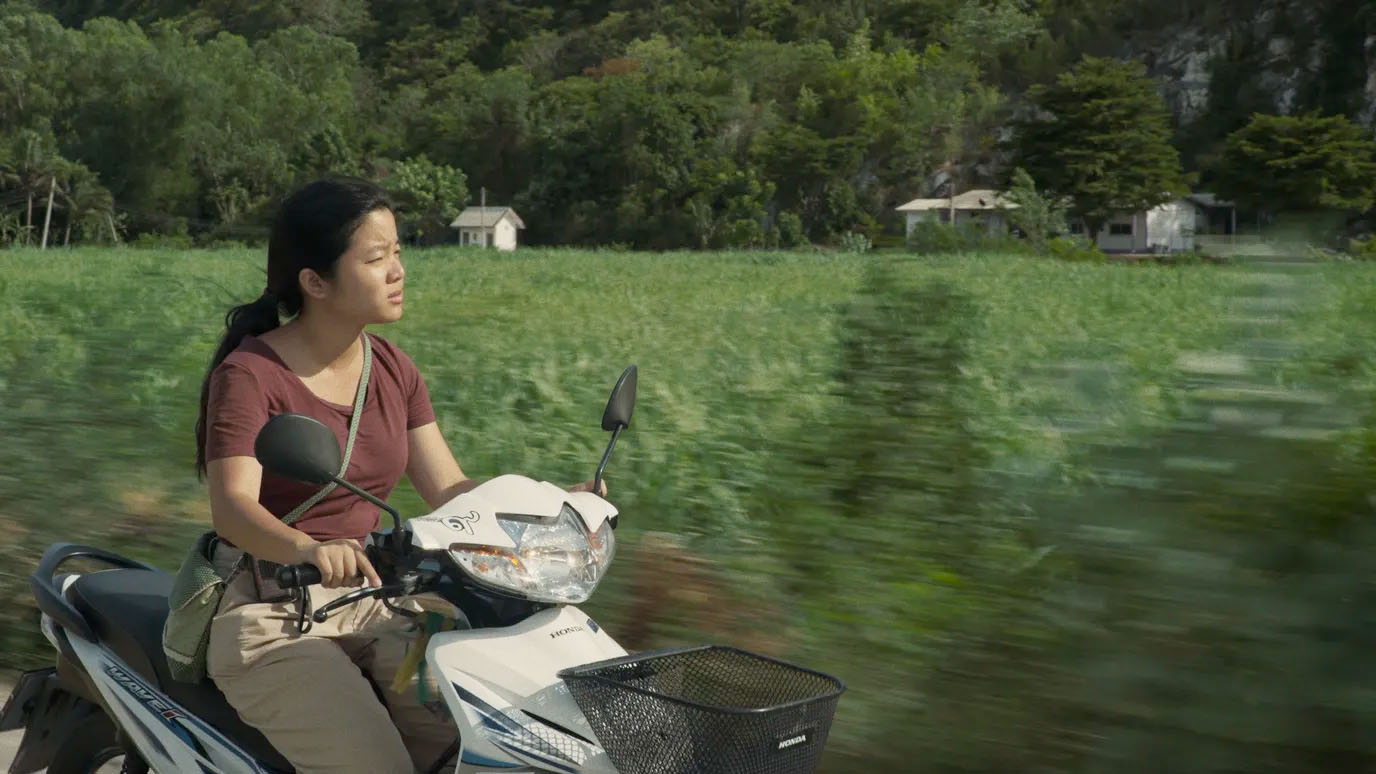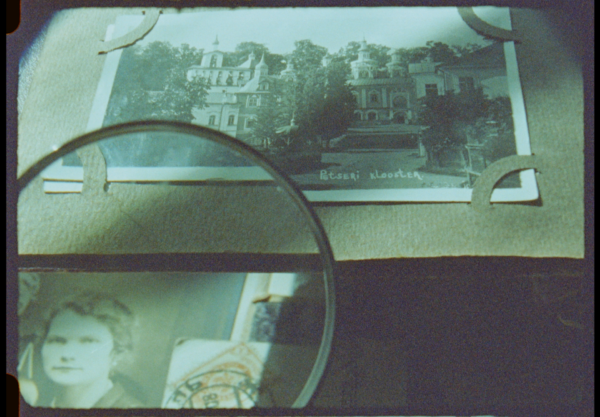Belief In Fiction
Lemongrass Girl
Pom Bunsermvicha’s embrace of metafiction in Lemongrass Girl comes as no surprise as it follows a recent trend in Thai cinema.

In Thailand there is a common superstition that rain can be prevented by the planting of lemongrass by a female virgin. As with many ancient traditions, this act has melted into the public consciousness as a fixture of life, with few giving it a second thought, becoming commonplace even in seemingly open and tolerant environments like film sets. It is this strange practice, one that relies on the intense scrutinisation of a woman’s personal autonomy, that Pom Bunsermvicha explores in her fifth short film, Lemongrass Girl, which premiered at the International Film Festival Rotterdam (IFFR) earlier this year.
The short film follows production manager Piano who is unwittingly thrust into the role of lemongrass girl and forced to contend with the implications of the job. Bunsermvicha shot the film on the real set of fellow filmmaker Anocha Suwichakornpong’s forthcoming film Come Here. Suwichakornpong herself wrote the script for Lemongrass Girl. The thin line between fact and fiction is consistently challenged as we’re shown real scenes of crewmembers working on Suwichakornpong’s Come Here, who are simultaneously acting within Bunsermvicha’s own fictional narrative. The film’s embrace of metafiction comes as no surprise as it follows a recent trend in Thai cinema.
As much as Lemongrass Girl is Bunsermvicha’s film, it feels equally at home in the growing oeuvre of its writer Suwichakornpong, whose past films include the cerebral By the Time It Gets Dark, which questioned whether filmmakers could ever authentically capture reality. The same playfulness that characterises Suwichakornpong’s work is present here, with the entire production having a scrappy quality, being populated with non-actors in the form of crew members ambling across pre-existing sets.
However, when considered in the context of the Thai indie scene, there is something disarming about Lemongrass Girl. One of the great ideas the film explores is that the things we normally deem as naturalistic—mumbled dialogue, amateurish acting, and messy sets—are still intensely staged and inherently fake, therefore immediately challenging our understanding of (its) filmic reality from the start. One of the first shots is of a woman slowly walking through a forest. Before we are able to fully register this image, the film cuts to a shot where the woman is merely in the background, the focus being on a boom mic operator observing the scene.
This playful juxtaposition is one of the primary tools Bunsermvicha employs in crafting her cinematic language: the quick cut between staged and real. This is also observed in a later scene where the camera focuses on the floor strewn with snacks and food wrappers, which we are led to believe are from the crew members, before the scene cuts to a group of actors sitting around this mess being fed lines. Something as normal as trash on the floor is revealed to be carefully manicured and arranged for a scene, causing one to question everything the film presents.
One seemingly authentic detail Bunsermvicha does relish in is how inherently unglamourous life on a film set really is. Crew members are frequently portrayed as hunched over, sitting on lawn chairs in the forest, and frantically getting things ready for filming. Bunsermvicha favours still wide shots, which show off the lush, unoccupied forest in some scenes and, in others, expose the many details of the set. A sort of incongruity can be observed in seeing the forest crowded with large industrial equipment and cameras poking in from the edges of the frame as if filmmaking is an inherently disharmonious process to nature. But it feels like an apt visual representation for people who believe they can control something as natural as the weather.
Nonetheless, despite the film’s metafictional aspects, what does ring true here are the emotions of Piano, as conveyed through Primrin Puarat’s sensitive performance as she unpacks how the role of the lemongrass girl affects her. We first see her praying at an altar, deep in thought, with a joss stick in hand. We perceive her as a character of great conviction and belief, which places her in contrast to those around her, as while everyone else on set treats the role of lemongrass girl with levity, to her it adopts a sense of reverence.

Lemongrass Girl
Piano herself is only thrust into this position due to the apprehension of the previously assigned lemongrass girl who declares in embarrassment that she cannot do the job “Because it’ll rain”, and “Everyone will find out”. The paradoxical nature of this job is made clear, as it places an outside, uncontrollable force as the arbitrator of a woman’s perceived “purity.” Other than acting as a simple precautionary measure, the inevitability of rain makes it so that it does not matter whether the woman is a virgin or not, as there are only two possible outcomes: it does not rain, and the woman’s reputation is protected or it does rain and she becomes prone to light judgment by her crewmates.
Throughout the film, the talk of the lemongrass girl enables the crew members to joke around extensively about female autonomy and anatomy. In one scene, after hearing about Piano taking on the role, someone glances at her boyfriend and asks, “You two haven’t done it yet?”. Though this is played for laughs, there is visible discomfort on Piano’s face, as the most intimate details of her life are aired out by others, mirroring the policing of female autonomy still prevalent in Thai culture.
Bunsermvicha goes out of her way to display the genuine nature of Piano’s beliefs, cutting between these scenes of people joking around about the ritual with scenes of Piano undertaking it. Whenever Piano starts the ritual, the mood becomes solemn. Bunsermvicha uses wide shots to emphasise Piano’s solitude: a small figure within the expansive forest, kneeling down, planting the lemongrass, and praying. There’s a sincerity in her actions lacking in those around her. It becomes clear that Piano’s conviction in her beliefs is why the job carries such a burden and why she becomes so affected by the comments of others.
Bunsermvicha is obsessed with interrogating how truth is valued today, from the perspective of both the audience and her characters. Through the metafictional aspects, we come to see a startling artificiality at the film’s core despite its naturalistic features. This seemingly intentional hollowness could be attributed to the scrappy nature of the production, refusing to provide weighted answers to the questions surrounding authenticity it presents—simply being a fun thing worked on while on the set of a bigger project.
However, the thematic heft of the film only becomes more potent from the casual indifference projected by the audience in regard to the film’s authenticity and the film’s characters in regard to the actual practice of the lemongrass girl. Bunsermvicha creates a world of indifference where traditions are adopted, not because they may be inherently true, but because they are familiar. The fact people fail to question them is how they maintain their consequences, inflicting real damage on people. Though Piano’s faith in the ritual and the ritual’s inherent ability to hurt her seem contradictory, in an age of insincerity, belief is one of the few things that feels authentic.





There are no comments yet, be the first!